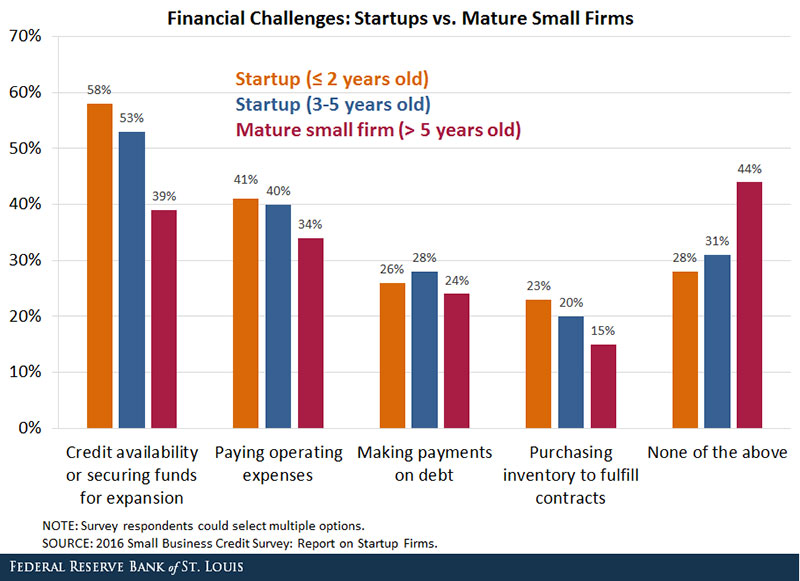New startup failure statistics can be alarming. Depending on what criteria is used to define a start-up, the failure rate is as high as 90%.
1 in 5 of these will fail in the first year of business. All new businesses face some risk of failure, and this varies based on a variety of factors.
Businesses in established markets and industries are less likely to fail. But innovative and niche industries face a much higher chance of failure.
Yet, innovators also have a higher chance of exponential growth and reward.
Most startup founders agree that starting a business is hard. Many entrepreneurs are heavy on passion but light on expertise and experience.
Even experienced professionals will experience a wide range of unexpected problems. For instance, issues connected to the delivery process of the goods.
Many startups are testing untried technologies and new markets. Some are using exciting innovation, but with innovation comes risk.
Some new ventures begin with high expectations only to fail in spectacular fashion. Others defy expectations and flourish in undiscovered markets.
What are the trademarks of startups that fail and ones that succeed?
The common cause for most startup failures isn’t a mystery. Across all industries, products, and services the causes of startup failure are the same.
How can you identify potential pitfalls for your startup? This list of common pitfalls will help you to evaluate your startup venture.
While the statistics give a reason for pause, there is also a reason for confidence. The reasons behind startup failure are well-known and common across industries.
This examination of common startup failure causes can help you to avoid them. Finally, check out a few steps to beat the odds.
Common Startup Failure Causes
Financial Problems

It comes as no surprise that financial problems are one of the most common causes of startup failure. Financial troubles vary, but they indicate the company did not have the necessary funds.
Some of the most common types of financial problems are:
- Undercapitalization
- Inability to obtain financing
- Low Revenues
- Cash Flow Problems
Some startups discover that their financial problems began before they ever got started. They realize they cannot maintain growth and were undercapitalized to begin with.
Others start out well but hit roadblocks trying to obtain financing. Financing is necessary to fund expansions or rapid growth infrastructure.
Some fail to hit marketing and sales milestones and must deal with the result – low revenues.
Partnership Problems
Many new business ideas develop between family or friends. In these situations, it would seem as though partnership disagreements could never happen.
However, partnership problems are a surprising cause of failure for many startups.
A company may have the best idea or product and huge profitability. Yet it will still fail if the founders or partners can’t get along.
Partnership problems can prevent the company from moving forward. Disagreements hinder the securing of contracts or financing and implementing plans.
Many give up and walk away from the nightmare created by partnership problems. Some of the factors that can lead to partnership problems are:
- Questions of hierarchy
- Imbalanced workloads
- Lack of written agreements
- Unresolved disputes
- Duplication of roles
It’s not uncommon for some partners to feel like they put more sweat equity into the business. Over time resentment can grow.
Other times partners find themselves agreeing on everything in the beginning. So they fail to establish a hierarchy of leadership and decision-making authority.
When disagreements arise there is no established way to break a stalemate and move forward. Not only does this lead to a failed start-up but also soured relationships and broken family ties.
Leadership Problems

Leadership problems are often confused with partnership problems. Sometimes the two are related.
It is possible to have an excellent partnership or no partnership at all and still have leadership problems.
Know-it-all leaders are red flags for startup failure. They may be experts in one field and enjoyed success in that field.
This can create a false sense of confidence. They may believe that success will follow them wherever they go and whatever they do.
Leaders that have failed in the past make better leaders and are less likely to have their startups fail. They have learned hard lessons and gained experience in handling crises.
Leaders that haven’t ever failed often don’t know how to ride out life’s storms and persevere.
A leader may be an expert in the field or service the business is in but that doesn’t mean they are a business expert. It is important that they are aware that they don’t know everything.
Good leaders ask for help and advice. They build a team that gives the startup company an expert for every aspect of the business.
The best leader is also the leader that is present. Hands-off management strategies will backfire with fledgling companies.

A board of directors that is too busy with other ventures will not be able to act decisively on urgent matters.
This is a common scenario when Venture Capitalists occupy a place on the board of directors. Although they have the expertise, if they aren’t present and attentive they will simply weigh the company down.
Rather than adding value to the company, an absentee VC will hinder progress. A Venture Capitalist that doesn’t know the business won’t be able to provide valuable insights.
Exercise great caution when selecting a VC. The company will be tied to them.
The common causes of leadership problems are:
- Overconfident leadership
- Lack of business expertise
- Absentee leadership
Marketing Problems
Not knowing the market or how to market your product or service is a reason why many startups fail. Every startup needs to focus its marketing efforts and budget.
Having an undefined or overly large target market means stretching the marketing dollars. Many startups strike out not knowing their target demographic.
Identify who the competition is and ask for advice. Again, know what you don’t know.
Find experts that can help to identify the target market. This will reveal how much the market will pay for your product.
A good baseline is to establish CAC & LTV for customers.
CAC (Cost of Acquiring Customer) establishes what marketing to undertake to gain new customers. LTV (Lifetime Value of Customer) establishes what revenues that customer will generate for the company.
This has to work out to a sustainable and scalable equation or the startup will fail. Then consider the issue of timing.
Is the market ready for this product or service? Is it saturated with similar products or services?
The most common marketing missteps are:
- Failure to define the target market
- Failure to test market readiness
- Lack of marketing expertise
Lack of Goals
Startups need to define the goals and milestones they hope to achieve. It’s good to put the goals in writing and create a timeline for reaching them.
An example of a timeline goal could be to reach a specific dollar amount in sales by a certain date. Other goals could include specific profit margins at specific times or seasons.
Include marketing goals too. For example, set a goal of a certain number of social media followers on a specific platform at specific time intervals.
Milestone timeline markers could include items like obtaining distribution contracts. They can also include production volumes or expansion thresholds.
Startups tend to focus on revenues and not on profit. This can result in cash flow problems.
Difficulty securing financing follows shortly behind this. Growing too fast is not always a good thing. In our failed startups article, we mentioned a few who kicked the bucket for growing too fast and then not keeping up the pace.
A clearly designed business plan with well-established goals and budget is key. A team with the discipline to stick to the budget will be more successful.
Focus on profits and the revenues will correct themselves. Manage the rate of growth.
For example: when product beta testing is complete or when product distribution is established. These are opportunities to secure financing and raise capital.
Establish in advance at what milestones or goals the company will raise capital. Venture Capitalists can offer an influx of cash.
Exercise caution as this also can entail a shift of leadership and team dynamics. Ensure that you raise capital at an optimal time and terms for sustained growth and success.
Common problems resulting from lack of goals include:
- Uncontrolled growth
- Focus on revenues over profitability
- Lack of defined goals
- Lack of established budget
Team Problems
One problem is having teams of excessively like-minded people. This prevents the debate of new or better ideas and options.
A team of intelligent and ingenious minds is always a plus. However, a lack of business knowledge and experience will have a profound effect.
A good team needs to have an emphasis on marketing and sales. This is true regardless of the product, industry, or service.
A lack of set roles leads to duplication of tasks. Make it clear what each team member is responsible for.
Also, make clear who each team member reports to and is accountable to. Identify ways to resolve conflicts and who to report them to.
Lack of team oversight can mean problems go unchecked until they become catastrophic. Hold team members accountable and learn from mistakes as a team.
Small mistakes and obstacles can be warnings of bigger problems to come.
They can debate the problem and settle on the best idea or solution.
A good team expects challenges and when challenges arise they work the problem.
Good team members are good listeners and will ask for help. They seek advice and they learn from their mistakes.
Common indicators of team problems are:
- Teams of ‘yes men’
- Lack of business expertise
- Undefined roles
- Lack of oversight/accountability
Legal Problems

Legal problems aren’t the most common cause of startup failures. But there is no such thing as a small legal problem.
Select legal experts from the start and establish relationships with legal advisors.
Legal problems have sunk quite a few startups before they ever reach the market. This is particularly true of highly regulated or intellectual property industries.
Thorough research into the regulations affecting a particular product or industry is key. Identify the governing and regulating authorities for your startup and do your homework.
Trademark, Copyright, and Patent laws can also be sticky areas. Thorough research by legal experts may be appropriate.
The time and expense involved at the beginning are an investment in the startup’s long term value.
Common legal tripping points include:
- Failure to research patents
- Failure to research trademarks
- Failure to budget for legal compliance
- Failure to comply with regulatory guidelines
- Costly launch delays
10 steps to Beat the Odds
These common causes of startup failure may seem obvious. The problem is that it only takes one of them to sink a startup.
So it’s important to be objective. Examine your startup and identify the weak spots.
Get the perspective of someone on the outside. Find out what others see as the startup’s greatest area of risk.
Ask questions like: What don’t I know? What areas will require outside expertise? What are my leadership weaknesses? How will the team function? How will I gauge the market? When have I failed in the past? How will that failure help in this startup endeavor?
Review these 10 principles and examine how to apply them in your business model.
- Do research
- Establish a budget
- Create written goals and milestones
- Know what you don’t know
- Build a team of experts
- Create well-defined leadership roles
- Establish accountability
- Know the market
- Focus on profits
Identify & learn from mistakes & warnings
Some say that a startup needs 2 things to succeed: good marketing skills & good bookkeeping skills. While this may be an oversimplification it does drive home a couple of points.
- The business idea may be fantastic but the idea, product, or service must also sell. The product may be poor but if it sells it you will have more success than a superior product that isn’t marketed well.
- Sticking to a budget is vital, no matter how much revenue is coming in.
In conclusion, the causes of startup failure are common and clear. This means that the keys to success are clear and available too.
Financial problems, partnership friction, and weak leadership are obvious causes of failure. Lack of marketing strategy and failure to build a good team are other factors.
New startups can turn exponential profits and they can also improve the quality of life. That is why the founder of a startup needs to love what they do and be passionate about bringing it to market.
Before there are great rewards one must face great risk. Mitigate the risks with careful planning and forethought.
Asking for help and advice is a powerful preventative against startup failures.
FAQs about startup failures
1. What are the most common reasons why startups fail?
Startups fail for a variety of reasons, such as a lack of finance, poor management, a failure to establish a market fit, intense competition, and an inability to scale.
Additional factors include running out of money, struggling to draw in clients, and legal difficulties.
2. How can a lack of funding lead to startup failure?
Lack of money can make a startup fail by preventing it from developing its product or service, hiring top staff, or investing in marketing.
A startup may not be able to attract investors or obtain loans without sufficient cash, leaving it without the tools necessary to expand and compete in the market.
3. What are some examples of startups that failed despite having significant investments?
Quibi, which received $1.75 billion in funding but failed to develop traction, and Theranos, which was valued at $9 billion but ultimately collapsed owing to fraudulent activities and legal problems, are two famous examples of firms that failed despite large investments.
4. How important is market research and analysis in preventing startup failure?
Analysis and market research are crucial for avoiding startup failure. They let a startup locate a lucrative market, comprehend client requirements and preferences, and evaluate rivalry.
Without conducting adequate market research, a startup may create a good or service that is not in demand, making it challenging to get clients and make money.
5. Can poor management and leadership be a cause of startup failure?
Absolutely, ineffective management and leadership can play a big part in why a firm fails. Poor decision-making, a lack of direction, and an inability to adjust to shifting market conditions can all result from ineffective leadership.
A startup may find it difficult to draw in investors, talent, or consumers without excellent leadership.
6. What role do co-founders play in the success or failure of a startup?
Co-founders are crucial to a startup’s success or failure. They are in charge of creating the company’s vision and strategy, hiring employees, obtaining financing, and overseeing daily operations.
Co-founders who are compatible and collaborate well can lay a solid foundation for a startup’s success, while those who are not risk conflict, discord, and failure.
7. How can startups avoid the pitfalls of overconfidence and overestimating their potential success?
By doing in-depth market research and analysis, requesting input from clients and industry professionals, and remaining receptive to criticism and constructive criticism, startups can avoid the problems of overconfidence and overestimating their future success.
Having a practical business plan and the flexibility to change course and adjust as necessary is also crucial.
8. How can a startup’s product or service not meet customer needs and lead to failure?
A startup may fail if its product or service doesn’t satisfy customers’ needs. Without a product or service that appeals to customers, it might be difficult to draw in new clients, keep existing ones, make money, or experience long-term growth.
Startups must create goods or services that satisfy customers’ needs and real-world problems.
9. What is the impact of competition on the failure of startups?
Startup failure can be significantly influenced by competition. Startups must set themselves apart from rivals in congested markets by providing distinctive value propositions.
Failing to do so may make it more difficult to draw in clients, make money, and achieve long-term growth. Also, startups need to be aware of new rivals and ready to change with the times in the market.
10. How can startups pivot and adapt their business model to avoid failure?
By listening to customer input, keeping an eye on market trends and consumer behavior, and being prepared to experiment and iterate, startups can pivot and change their business model to prevent failure. Startups must also be adaptable and ready to change course fast if their first plan fails.
Startups that can spot new opportunities, adjust rapidly to shifting market conditions, and innovate to stay one step ahead of the competition are successful. Making significant changes to a startup’s product or service, target market, or revenue model is known as pivoting.
For startups to avoid failure and achieve long-term success, they must stay adaptable and willing to pivot when necessary.
If you liked this article about startup failure, you should check out this article about what happened to MoviePass.
There are also similar articles discussing what happened to Quiznos, what happened to Pan Am, what happened to Sears, and what happened to BlackBerry.
And let’s not forget about articles on what happened to Pontiac, what happened to Circuit City, what happened to American Apparel, and failed startups.
- Transit’s Lost Leap: What Happened to Leap Transit? - April 20, 2024
- Crafting the Perfect App Description to Engage Users - April 20, 2024
- Ultimate Streaming: Entertainment Apps Like Kodi - April 19, 2024









